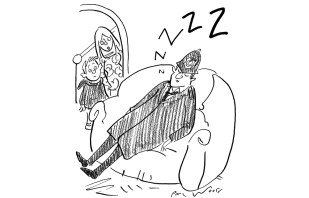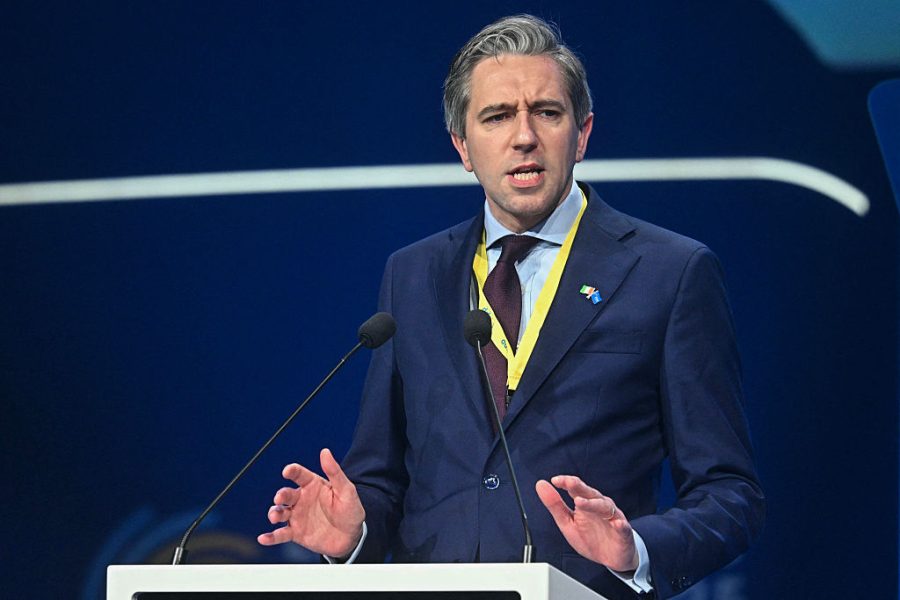I was thrilled to learn that our government intends to enjoy an ‘open’ relationship with China – one of my favourite countries, as I am sure it is yours. Sir Keir Starmer announced this intention when he bumped into Xi Jinping at the G20 beano in Rio de Janeiro. He also said: ‘We want our relations to be consistent, durable, respectful, as we have agreed, avoid surprises where possible. The UK will be a predictable, consistent, sovereign actor committed to the rule of law.’ Those agreeable adjectives are all Keir’s – I didn’t slip any in, surreptitiously, Not even ‘predictable’, which I assume was there to reinforce the earlier commitment to not surprising the Chinese, perhaps by jumping out from behind a hedge and demanding the return of Hong Kong. It is clear that the Chinese are averse to surprises. By way of reply Xi commended Sir Keir on his economic policy, despite not seemingly knowing what it is. But then one fears that Rachel Reeves is in exactly the same boat.
It is the apogee of the liberal left’s delusion that one should not deal with the world as it is
This was something of a coup for Starmer – first that Xi recognised who he was and second that he was able to be nice to him for a moment. The government knows that its relationship with the leader of the free world, the USA, is about as parlous as it is possible to get and so it will come as some succour to have gained the fleeting approval of the leader of the unfree world. British foreign policy towards China has been, for at least two decades, a little schizoid. We want the crap goods they produce and we very much want them to buy our crap goods. We also approve of their investing in British stuff – so long as it’s not something which might be crucial to our security, such as nuclear power plants.
At the same time, we are not wholly on board with some of the things that China gets up to. Shall I list just a few of them? The suppression and imprisonment of those Chinese in Hong Kong who would like a little freedom. The complete lack of freedom of speech. The executions. The police state imprisonments of writers and artists. The occupation of Tibet. And the continued, relentless persecution of the Uighur Muslim minority in the west of the ghastly Middle Kingdom. (Regarding this last point, some might call their actions genocide, were it not for the fact that the term is these days only applicable to Israel’s, as far as the Uighurs’ fellow Muslims are concerned. The Muslim world seems blithely indifferent to the enormous crimes perpetrated by the Chinese against their brothers. There are no marches in Beijing, no demonstrations outside Chinese embassies in the West. They have time for only one criminal, Israel.)
What this has meant is a stop-start relationship with China: mini-thaws, during which trade deals are joyously announced, and then mini-freezes when China executes a dissident, or we discover that it could turn all our lights off at the flick of a switch, and might well do so. In the old days, when China was a communist country and neither its economy nor indeed it military worried us terribly much, none of this mattered. Every few years the Chinese would bung us a panda and that was the end of it.
But now we are more worried by China than those other Asian rogues – Iran, North Korea and, of course, Russia. If what Starmer means is that henceforth we will co-operate economically with China and not let the nasty stuff bother us too much, then that is at least a coherent policy which may in the end be to our short-term economic advantage. But what it most certainly is not is an ethical foreign policy, even if Labour tends to look with a greater degree of indulgence upon countries which have either ‘communist’ or ‘socialist’ in their official titles, no matter how fantastically foul they might be. But I do wonder if it means that Starmer has come to the conclusion – largely correct – that there is actually no such thing as an ethical foreign policy because it would lead to a situation in which our trade dealings were confined to Denmark. If he has come to this conclusion, then perhaps he might explain it to the rest of the Labour party, who take a very different view indeed.

Of course the whole notion of an ‘ethical foreign policy’ is cant of the very highest order, which is perhaps why Labour has been wedded to the notion for the past 30 years. It is the apogee of the liberal left’s delusion that one should not deal with the world as it is, but with it as we might want it to be, or sometimes dream it might be. It is the delusion of a starry-eyed sixth former and in practice it is abandoned almost immediately because it makes no sense.
It is sometimes said the Blair government employed an ‘ethical foreign policy’. Certainly that is what the members of the party wanted and the term was used by both Robin Cook, before he became foreign secretary, and the likes of Clare Short. However, as soon as Cookie got his feet under the desk, the terminology changed. Labour would instead pursue a ‘foreign policy with an ethical dimension’, Cook averred. This was as meaningless as it sounds and what it meant in practice was that Labour pursued a pragmatic – and as we came to see, rather violent – foreign policy with no ethical dimension whatsoever, unless you count trying to bomb democracy into Iraq and creating a civil war which lasted for 20 years. The ethical stuff was basically palmed off to Short at the Department for International Development, who was allowed to dig a well for some Africans every so often.
Starmer’s Labour, meanwhile, has been jabbering about an ethical foreign policy and looking forward to a sunlit upland in which international relations are not dictated by money and power. Now, in that case, would seem to be the time for Starmer to remind them that the only truly ethical foreign policy is one which concerns itself exclusively with looking after our country’s interests. The rest is just wishful thinking and hypocrisy.








Comments